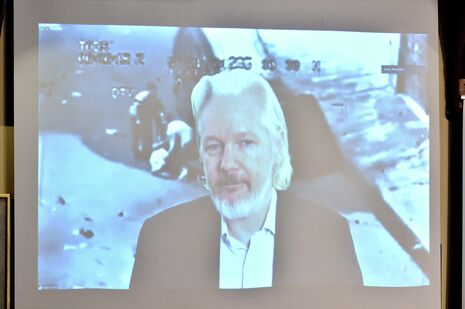A Brief History of Assange at the Cambridge Union
Harry Curtis examines Julian Assange’s controversial past when it comes to speaking to Cambridge students

In the midst of all the anticipation and the referendum, it’s easy to forget that Julian Assange’s appearance at the Union on Wednesday night was by no means a debut, nor was it the first time the WikiLeaks founder has caused controversy in Cambridge.
Assange’s first Union appearance came in March 2011, giving the Union the dubious honour of being his first public speech after the warrant for his arrest was issued by the Swedish Director of Public Prosecution in November 2010, following alleged sexual offences in August of the same year.
Speaking to hundreds of members who queued for hours in order to attend the event, Assange warned that the internet “is a technology that can be used to set up a totalitarian spying regime” and poses a threat to freedom of speech, human rights and civil life.
While he conceded that the internet also allows us to “know to an unprecedented level what government is doing” and aids co-operation between activists, Assange also took a sceptical stance on the role of social media in the Arab Spring that was sweeping Egypt among other countries at the time.
Claiming that WikiLeaks had themselves influenced the unrest in the region – as well the US decision not to back ousted leader, Hosni Mubarak and his would-be successor, Omar Suleiman – Assange argued that sites such as Facebook helped the authorities round up dissidents rather than facilitating co-ordination between revolutionaries.
Addressing the role of WikiLeaks more generally, Assange claimed the organisation acted “within a system of ethics” to protect free speech against US censorship “every bit as pernicious as […] censorship in the Soviet Union” and “a global system of patronage which has its centre of gravity in Washington.”
Fast forward to November 2012, and it was announced that the Australian was again due to speak and take questions at the Union, this time via video-link from the Ecuadorian embassy in London where he had, by then, taken refuge.
Assange had incidentally been invited just months after the Union had played host to former French minister and IMF director Dominique Strauss-Kahn, at the time also accused of rape, in March.
The announcement prompted a petition signed by over 900 people to call for the invitation to be revoked, with then CUSU Women’s Officer Susy Langsdale accusing the Union of both “colluding in the horrific silence and shame around rape” and “enabling the rebuilding of the public persona of an alleged rapist.”
What followed was a furore that involved a “presidential interpretation of the constitution” in order to allow electronic signatures for the petition to be accepted, after it was earlier insisted that they had to be hand-signed – a stance that caused a storm with disabled students.
The topic that Assange was due to speak on that night in November 2012 was never revealed and the event was eventually cancelled – albeit, for the stated reason that Assange was having technical issues with the video-link equipment.
A post on the Union Facebook page explained that, due to the Ecuadorian embassy’s poor internet connection, the only way to produce a two-way video feed was to use vans supplied by a broadcast agency, which was unable to provide the equipment on the night in question.
The Union were later left embarrassed after it was revealed that he would be speaking via video-link, from the Ecuadorian embassy, to a conference in Hamburg on the same night he was initially supposed to have been addressing Cambridge Union members.
Though he did appear at the Oxford Union in January 2013 and routinely refused to answer questions about the allegations against him and his decision not to return to Sweden in order to face those charges, the fiasco of 2012 goes some way to explaining the long wait for Assange’s second Cambridge Union appearance.
 News / Christ’s announces toned-down ‘soirée’ in place of May Ball3 February 2026
News / Christ’s announces toned-down ‘soirée’ in place of May Ball3 February 2026 News / Right-wing billionaire Peter Thiel gives ‘antichrist’ lecture in Cambridge6 February 2026
News / Right-wing billionaire Peter Thiel gives ‘antichrist’ lecture in Cambridge6 February 2026 News / John’s duped into £10m overspend6 February 2026
News / John’s duped into £10m overspend6 February 2026 News / Epstein contacted Cambridge academics about research funding6 February 2026
News / Epstein contacted Cambridge academics about research funding6 February 2026 News / Corpus FemSoc no longer named after man6 February 2026
News / Corpus FemSoc no longer named after man6 February 2026









